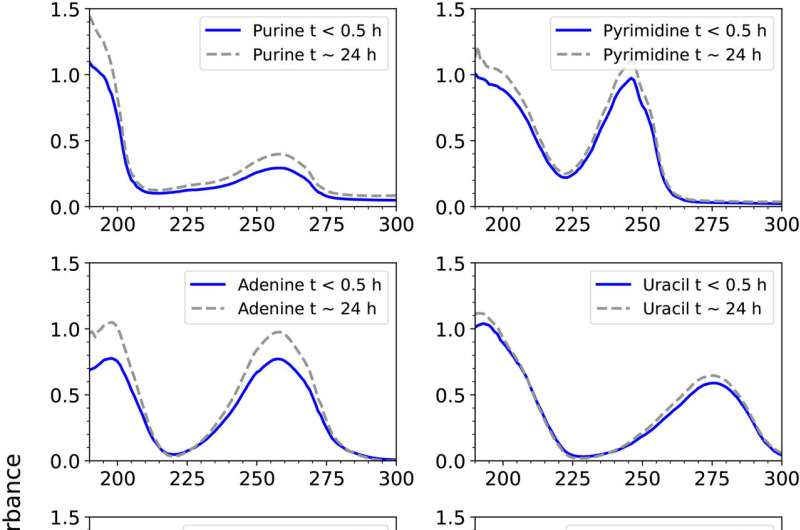June 14, 2023 report
This article has been reviewed according to Science X's editorial process and policies. Editors have highlighted the following attributes while ensuring the content's credibility:
fact-checked
peer-reviewed publication
trusted source
proofread
Venus' sulfuric acid clouds cool enough to host RNA and DNA bases, says study

A team of chemists, biologists and planetary scientists from MIT, Nanoplanet Consulting, Harvard University and the University of Alberta has found via lab experimentation that conditions in Venus' clouds are possibly conducive to hosting life. In their paper published in Proceedings of the National Academy of Sciences, the group describes experiments they conducted in their lab and their results.
Prior research has shown that the surface of Venus averages approximately 462°C, much too hot to support life. However, the planet's atmosphere is much cooler, particularly in its clouds—temperatures there are just 30°C to 70°C, well within a range that could support life. But such clouds are composed of sulfuric acid, which are far more acidic than any clouds found on Earth. Still, the possibility that life could exist in such an environment intrigued the research team. They set up experiments to determine whether RNA and/or DNA bases could survive in such an environment.
The experiments involved exposing nucleic acid bases such as cytosine, adenine, thymine, guanin and uracil to chemical conditions similar to those believed to exist in Venusian clouds. The then did the same with pyrimidine and purine nucleic acid base cores and to 2,6-diaminopurine. They then tested the stability of the acid bases using NMR and UV spectroscopy. They found that the acid bases remained stable under such conditions and remained so for up to two weeks—by extension, this meant that they could do the same in Venusian clouds.
The researchers suggest their findings might be shocking to planetary scientists, but doubt many chemists would be surprised. They note that it is common knowledge that refining oil involves the use of concentrations of sulfuric acid, resulting in the production of organic compounds, some of which are aromatic molecules. They suggest that space scientists looking for life elsewhere in the universe may have to expand their possible targets to include the atmospheres of planets, not just their surfaces.
More information: Sara Seager et al, Stability of nucleic acid bases in concentrated sulfuric acid: Implications for the habitability of Venus' clouds, Proceedings of the National Academy of Sciences (2023). DOI: 10.1073/pnas.2220007120
Journal information: Proceedings of the National Academy of Sciences
© 2023 Science X Network




















